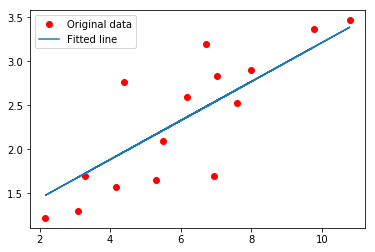- # 包
- import torch
- import torch.nn as nn
- import numpy as np
- import matplotlib.pyplot as plt
- # 超参数设置
- input_size = 1
- output_size = 1
- num_epochs = 60
- learning_rate = 0.001
-
- # Toy dataset
- # 玩具资料:小数据集
- x_train = np.array([[3.3], [4.4], [5.5], [6.71], [6.93], [4.168],
- [9.779], [6.182], [7.59], [2.167], [7.042],
- [10.791], [5.313], [7.997], [3.1]], dtype=np.float32)
-
- y_train = np.array([[1.7], [2.76], [2.09], [3.19], [1.694], [1.573],
- [3.366], [2.596], [2.53], [1.221], [2.827],
- [3.465], [1.65], [2.904], [1.3]], dtype=np.float32)
-
- # 线性回归模型
- model = nn.Linear(input_size, output_size)
-
- # 损失函数和优化器
- criterion = nn.MSELoss()
- optimizer = torch.optim.SGD(model.parameters(), lr=learning_rate)
- # 训练模型
- for epoch in range(num_epochs):
- # 将Numpy数组转换为torch张量
- inputs = torch.from_numpy(x_train)
- targets = torch.from_numpy(y_train)
-
- # 前向传播
- outputs = model(inputs)
- loss = criterion(outputs, targets)
-
- # 反向传播和优化
- optimizer.zero_grad()
- loss.backward()
- optimizer.step()
-
- if (epoch 1) % 5 == 0:
- print ('Epoch [{}/{}], Loss: {:.4f}'.format(epoch 1, num_epochs, loss.item()))
- Epoch [5/60], Loss: 7.7737
- Epoch [10/60], Loss: 3.2548
- Epoch [15/60], Loss: 1.4241
- Epoch [20/60], Loss: 0.6824
- Epoch [25/60], Loss: 0.3820
- Epoch [30/60], Loss: 0.2602
- Epoch [35/60], Loss: 0.2109
- Epoch [40/60], Loss: 0.1909
- Epoch [45/60], Loss: 0.1828
- Epoch [50/60], Loss: 0.1795
- Epoch [55/60], Loss: 0.1781
- Epoch [60/60], Loss: 0.1776
- # 绘制图形
- # torch.from_numpy(x_train)将X_train转换为Tensor
- # model()根据输入和模型,得到输出
- # detach().numpy()预测结结果转换为numpy数组
- predicted = model(torch.from_numpy(x_train)).detach().numpy()
- plt.plot(x_train, y_train, 'ro', label='Original data')
- plt.plot(x_train, predicted, label='Fitted line')
- plt.legend()
- plt.show()




